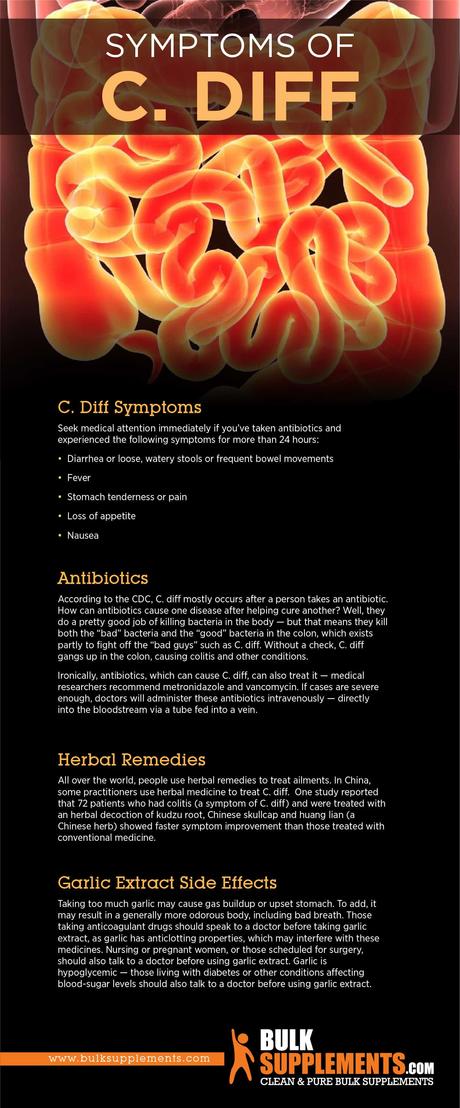Have diarrhea? Maybe a stomach ache, nausea or fever? Have you been running to the bathroom for more than 24 hours? You may have more than just an intestinal infection or the stomach flu — you may have contracted C. diff.
What Is C. Diff?
The official name of this nasty bacteria is Clostridium difficile, or more commonly C. difficile, or C. diff. It lives in harmony in the intestines of some, though those who have it living in them without issue can spread it through fecal matter by touching surfaces.
It’s a fecal bacterial spore shaped like a rod. People can spread it by touching each other or soiled objects such as bed sheets, stair rails, medical equipment, toilets and bathtubs (x). Making matters a bit worse, C. diff can survive outside of the body and on improperly disinfected surfaces for approximately five months (x).
C. diff is potentially lethal when it produces spores people can inhale or swallow. When ingested, it causes intestinal inflammation, diarrhea and other severe symptoms. It can cause a serious condition that, if left untreated, releases toxins into the bloodstream. Sepsis (blood poisoning) can occur, which may result in life-threatening brain, heart and kidney damage (x).
Who is at Risk?
According to the Centers for Disease Control and Prevention (CDC), certain people are more at risk of contracting C. diff:
- Seniors 65 or older
- Those with recent hospitalizations
- Those with weakened immune systems
- Those who’ve had C. diff infections before (x)
C. Diff Symptoms
Seek medical attention immediately if you’ve taken antibiotics and experienced the following symptoms for more than 24 hours:
- Diarrhea or loose, watery stools or frequent bowel movements
- Fever
- Stomach tenderness or pain
- Loss of appetite
- Nausea
C. Diff Treatments, Remedies and Supplements
Antibiotics
According to the CDC, C. diff mostly occurs after a person takes an antibiotic (x, x). How can antibiotics cause one disease after helping cure another? Well, they do a pretty good job of killing bacteria in the body — but that means they kill both the “bad” bacteria and the “good” bacteria in the colon, which exists partly to fight off the “bad guys” such as C. diff. Without a check, C. diff gangs up in the colon, causing colitis and other conditions.
Ironically, antibiotics, which can cause C. diff, can also treat it — medical researchers recommend metronidazole and vancomycin (x). If cases are severe enough, doctors will administer these antibiotics intravenously — directly into the bloodstream via a tube fed into a vein.
Herbal Remedies
All over the world, people use herbal remedies to treat ailments. In China, some practitioners use herbal medicine to treat C. diff. One study reported that 72 patients who had colitis (a symptom of C. diff) and were treated with an herbal concoction of kudzu root, Chinese skullcap and huang lian (a Chinese herb) showed faster symptom improvement than those treated with conventional medicine (x).
Garlic Extract: Is It an Ancient Chinese Secret or a New-Age Remedy?
Another study suggests that supplements made from garlic extract can treat C. diff. The garlic supplement the study describes helps break down C. diff’s protective biofilm barrier (x). A different study, published in the Journal of Applied Microbiology, agrees that garlic can treat C. diff (x). This study’s results found that garlic, among other herbal remedies, can, in fact, damage C. diff’s biofilm barrier, corroborating the claim of the other study mentioned.

Garlic Extract Side Effects
Taking too much garlic may cause gas buildup or upset stomach. To add, it may result in a generally more odorous body, including bad breath. Those taking anticoagulant drugs should speak to a doctor before taking garlic extract, as garlic has anticlotting properties, which may interfere with these medicines. Nursing or pregnant women, or those scheduled for surgery, should also talk to a doctor before using garlic extract. Garlic is hypoglycemic — those living with diabetes or other conditions affecting blood-sugar levels should also talk to a doctor before using garlic extract (x).
Tips
This product is not water soluble; if not in gel capsules, it will have a strong taste. Gastrointestinal problems increase if taken on an empty stomach, so take it with a meal and plenty of water. Lastly, it should be stored in a dark, cool, dry area.
Diet
Diet monitoring is essential for patients recovering from C. diff infections. Hydrating with drinks that have sugar and salt helps recovery, and so does being gentle on the digestive system. Low-fiber, low-fat foods will help prevent further diarrhea and inflammation (x). The following list of foods are recommended to help patients recovering from C. diff heal:
- Soda crackers
- Toast
- Plain noodles
- Rice
- Cooked cereal
- Applesauce
- Bananas
- Peeled potatoes
- Noodles
- Refined grains (rather than whole grains)
- White rice
- Saltine crackers
- Soup
- Lower-fiber vegetables (green beans, beets, peeled zucchini)
Patients without appetites can try sipping broth or diluted fruit juice, and eating small meals slowly will help patients avoid overwhelming their symptoms.
The Bottom Line
Though it lives naturally in the intestines of some without causing an issue, C. diff is a bacteria that can cause an infectious illness, particularly in people taking antibiotics. The bacteria can spread by coming into contact with soiled surfaces, such as unclean hands, bed sheets and medical equipment — hospitals are breeding grounds for C. diff-related illnesses.
Though antibiotics can trigger C. diff-related illnesses, doctors also use antibiotics to treat them; metronidazole and vancomycin have shown treatment strength. Biomedical research has explored the efficacy of herbal remedies and supplements, such as garlic extract, for combating this disease more naturally, though clinical research hasn’t yet widely joined these studies. Therefore, more clinical research is needed to determine whether herbal remedies or supplements are indeed effective C. diff treatments.
